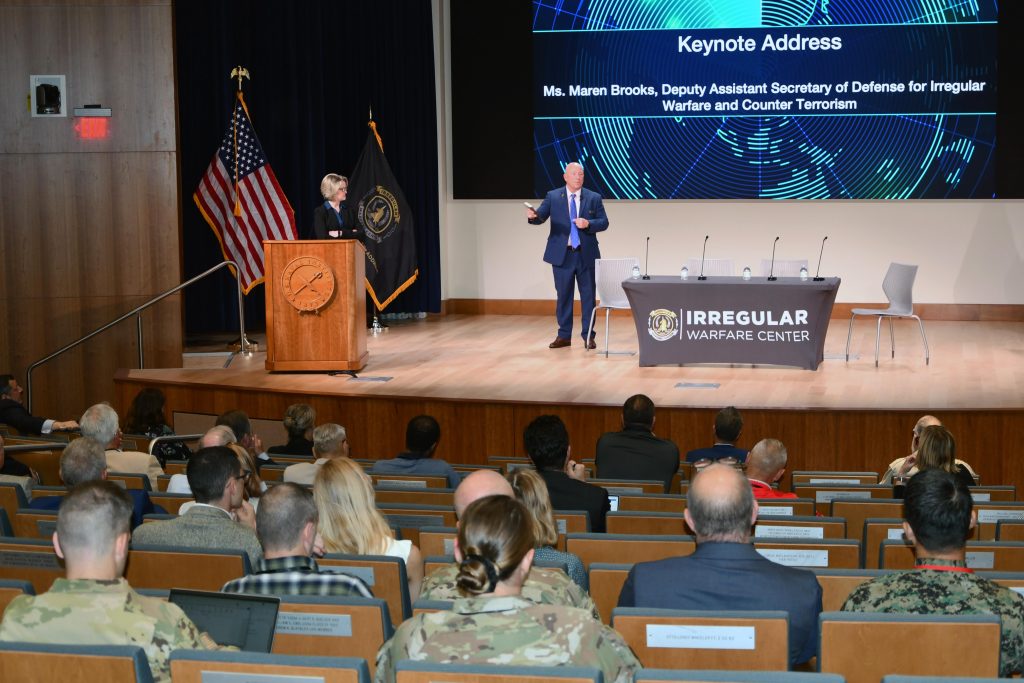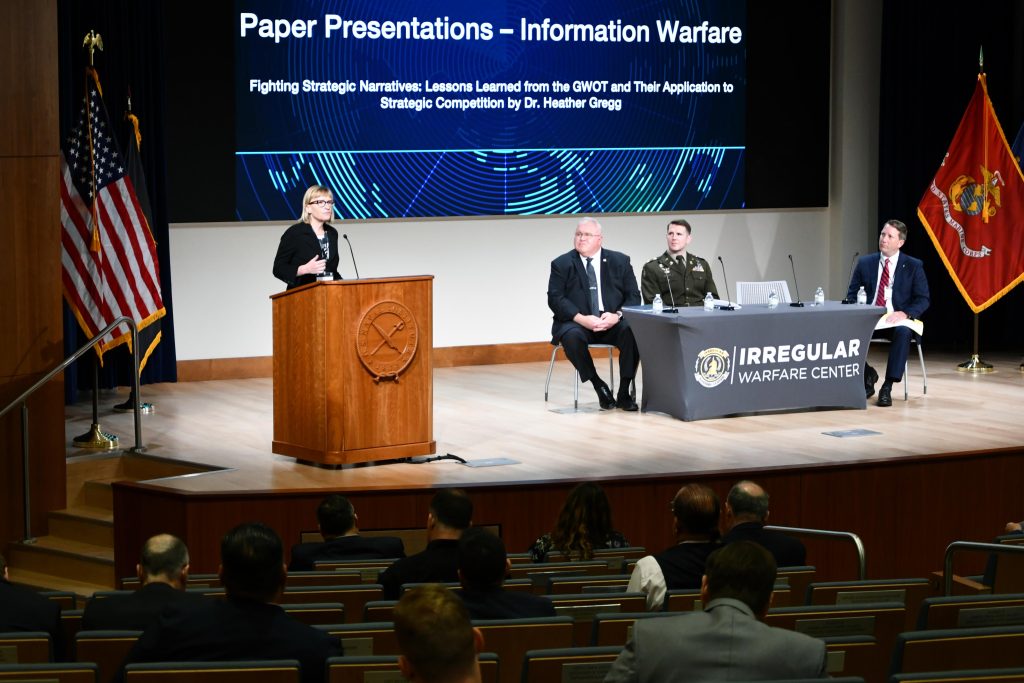
The IWC & FPRI Hosts Irregular Warfare Lessons Learned Since 9/11 Conference
The Department of Defense’s Irregular Warfare Center (IWC) and the Foreign Policy Research Institute’s (FPRI) Center for the Study of Intelligence and Nontraditional Warfare hosted a two-day IW Global War on Terrorism lessons learned since 9/11 conference, Sept. 17-18, 2024, at the U.S. Naval Institute’s Jack C. Taylor Conference Center in Annapolis, Md.

This event brought together a community of experts, military professionals, scholars, and policymakers to explore key insights and lessons learned from irregular warfare operations conducted by the U.S., allied nations, and non-state actors in the past two decades.
“The Irregular Warfare Lessons Learned Since 9/11 Conference underscores the importance of continuous learning and reflection in irregular warfare,” said Lori Leffler, IWC Deputy Director and Chief of Staff. “Our goal is to use these insights to prepare the next generation of irregular warfare leaders, ensuring that past experiences guide U.S. future strategies and solutions.”
The conference opened with remarks from Dr. Dennis Walters, Acting Director of the Irregular Warfare Center and Philip Wasielewski, Director of the Center for the Study of Intelligence and Nontraditional Warfare at the Foreign Policy Research Institute.
Ms. Maren Brooks, Deputy Assistant Secretary of Defense for Irregular Warfare and Countering Terrorism, provided the keynote address which emphasized advancing irregular warfare as the DoD’s contribution to strategic competition. Following her keynote address, Ms. Brooks and Dr. Walters engaged with the audience, answering questions on policy lessons learned and defining strategic success.

Many prominent voices were present for the event including USMC Gen. (Ret) John Allen, former Commander, ISAF – Afghanistan; MG (Ret) Edward Reeder Jr., former Commander, U.S. Army Special Warfare Center; Dr. John Nagl, U.S. Army War College; and Michael Vickers, former Undersecretary of Defense for Intelligence; General (Ret) Haibatullah Alizai, Commander, General Staff Afghan National Army.
The conference featured expert panel discussions and paper presentations covering various aspects of irregular warfare, including information operations, intelligence activities, police and militia forces in counterinsurgency, human terrain operations, as well as medical and logistics operations.
The Engaging with Partner Forces panel featured Alizai, where he shared his insights as a former Commander of the Afghan National Army. He accentuated the critical role of partners and allies as “key ingredients of success” in irregular warfare operations. “The right partners and allies help you understand the culture and the complexity of the situation and will help you resolve it at a low cost and in less time,” Alizai explained.
James Meil, who was selected to present his paper on U.S. military sealift capabilities, was enthusiastic about uncovering lessons learned from the Global War on Terror. “I was honored to have the opportunity to discuss my research here among irregular warfare experts. I’ve always had an interest in irregular and unconventional warfare, so engaging with the other presenters and participants has been fulfilling.” Meil explained. “The variety of content was great,” he continued, “I learned about some new concepts like human terrain and heard different perspectives related to my field of logistics.”

Human Terrain Panelist, Del Sanders (Senior SOF and IW Analyst), echoed the enthusiasm for being selected to share his practitioner’s perspective. “It was inspiring to be around so many people with a passion to learn from our past and continue to propagate the importance of understanding irregular warfare,” Sanders explained. “Human terrain needs to be integrated into the beginning of planning and operational development instead of after an operation has started. We need more people who have a hybrid background of academic expertise and SOF experience to bridge the gap between decision-makers, operators, and academics.”
The participants of the conference underscored the importance of dialogues relating to U.S. security policy challenges and opportunities. J.R. Seeger, former CIA Senior Case Officer, presented a paper on intelligence operations in Afghanistan. As a scholar and practitioner, Seeger explained that “There is value in bringing experts from different backgrounds to speak on the same subject. It enables the IWC to inform the DoD on a variety of IW-related topics.” He continued by sharing that “Enough time and distance has passed between our decisions in 2001-2003 to today. We have the opportunity to look back with clarity.”
Wasielewski stressed the need for engagement, stating that “After two decades of irregular warfare following 9/11 there is a deep reservoir of talent in this country, in various different facets of the field. This conference highlights that talent and brings forth new talent that will carry new generations into the future. There are so many lessons to be learned both positive lessons, mistakes made, and mistakes corrected.”
The IWC serves as the central mechanism for developing the Department of Defense’s (DoD) irregular warfare knowledge and advancing the Department’s understanding of irregular warfare concepts and doctrine in collaboration with key allies and partners.
The Center’s foundation is built upon three Lines of Effort:
- AMPLIFY and collaborate to build an innovative and adaptable global networked IW community of interest.
- Strategically ILLUMINATE current and future irregular threats, crises, and obstacles.
- ADDRESS current and future irregular threats to the US, allies, and partners by providing optionality to leaders.
Through these LOEs, the Irregular Warfare Center addresses current and emerging security concerns and challenges with world-class research, rigorous analysis, top-tier strategic education and training for U.S. and international partners.